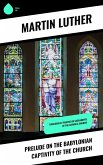In "Prelude on the Babylonian Captivity of the Church," Martin Luther presents a critical examination of the sacraments and the church's practices in the early 16th century, arguing against the prevailing Catholic doctrine. Luther's prose is incisive yet accessible, infused with theological passion and a reformative zeal that challenges the institutional authority of the Church. He draws extensively on biblical scripture, employing a historical context that underscores the tension between ecclesiastical tradition and scripture-based faith, offering profound insights into the socio-religious climate of his time. Martin Luther, a seminal figure in the Protestant Reformation, was deeply influenced by his experiences as a monk and scholar. His theological inquiries were often rooted in the quest for personal salvation and a desire to reform the Church from within. This work builds upon his previous writings, reflecting the growing disillusionment with corrupt practices and the yearning for a return to scriptural fidelity, thus marking a pivotal moment in religious thought. This enlightening treatise is highly recommended for scholars and lay readers alike who seek to understand the foundations of Protestant thought. Luther's courageous and innovative arguments not only shaped the Reformation but also continue to resonate in contemporary discussions about faith and authority.
Dieser Download kann aus rechtlichen Gründen nur mit Rechnungsadresse in A, B, BG, CY, CZ, D, DK, EW, E, FIN, F, GR, H, IRL, I, LT, L, LR, M, NL, PL, P, R, S, SLO, SK ausgeliefert werden.









